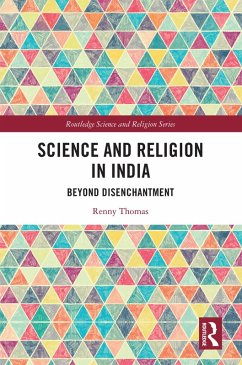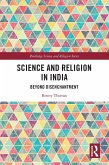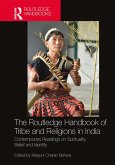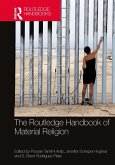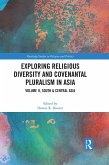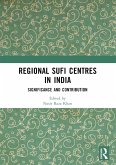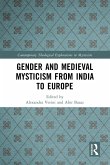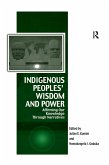Dieser Download kann aus rechtlichen Gründen nur mit Rechnungsadresse in A, B, BG, CY, CZ, D, DK, EW, E, FIN, F, GR, HR, H, IRL, I, LT, L, LR, M, NL, PL, P, R, S, SLO, SK ausgeliefert werden.
"Renny Thomas's ethnographic look at religious practices and beliefs among Indian scientists is a vital contribution to our understanding of religion, science, and social structures. It helps us wrestle with the inflections of modernity and the construction of scientific life across the world. Thomas's work surpasses typical studies by showing that religion--not just science--happens in labs and explores the politics of science and culture as that happens. This book engages both explicit and implicit religious practices and beliefs, including Indian forms of non-belief and atheism, and provides new ways of thinking about religion and science everywhere. Thanks to its wide-ranging contributions, this book is of profound significance." - Robert M. Geraci, Manhattan College, USA
"It has been increasingly recognised that many of the general conclusions drawn about the relations between science and religion are limited by a narrow focus on specific features of late Western modernity. This excellent new ethnographic study of science and religion in India helps remedy this deficiency. It prompts us to fresh questions about the applicability of the categories 'science' and 'religion' and about standard ways of relating them in terms of conflict or complementarity. This book also models a novel anthropological approach to science and religion that is reminiscent of the work of Latour and Woolgar. All up, this is a most welcome contribution to the science-religion field and is highly recommended." - Peter Harrison, University of Queensland, Australia
"In this remarkable book, Renny Thomas urges us to move beyond the political rhetoric of science and religion. In a pandemic weary world filled with tense engagements between religion and science, Thomas offers a rich, layered, and candid ethnographic study of postcolonial science in India - its labs and scientists- revealing a nuanced, complex, and tantalizing view of Indian science and scientists. He offers an important and urgent call - science cannot save us from religion, or religion from science - both are deeply implicated in claims of truth. We need to engage with them both. This is a book for our times." - Banu Subramaniam, University of Massachusetts Amherst, USA
"Renny Thomas's interesting work fills in many silences in earlier ethnographies on scientific laboratories.. Having drawn substantially in his review of literature on these sources, he proceeds to look at the essential way in which the question of compartmentalisation is posed in new ways. The question is really about co-existence and cultural relativism and the manner in which scientists are able to explain the presence of ritual, caste histories and cultural parameters in their life. Thomas is an engaging writer, using conversations with laboratory scientists to negotiate with paradoxes and puzzles in the manifest world of objectivity and patronage. Questions of equality and informative yet suppressed histories of conflict are key to the book. It is hard to upset the apple cart on experiential modes of Social Life, Ideologies and Reality, but he has succeeded in drawing attention to the vitality of focussed enquiry in social science, using personal biographies as his index for symbolic representation of every day practises." - Susan Visvanathan, Jawaharlal Nehru University, India
"This remarkable book is a major leap forward in the study of science and religion - it uncovers and dismantles West-centric modes of thinking about both categories. Thomas' insightful combination of ethnography and history examines closely the complicated and varied contexts of scientific identity and religious practice among Indian scientists. With skillful analysis of everyday practices in a major science institution - from publication schedules to cafeteria arrangements - Thomas demonstrates the persistence of religion, spirituality, and caste among both believers and non-believers. He has pioneered novel and essential ways to think about science and religion outside the West." - Matthew Stanley, New York University, USA
"How do forms of the religious life shape scientific life? Drawing on finely tuned laboratory ethnography and on conversations with scientists in India, Renny Thomas takes readers beyond dichotomies - mostly emergent from Western contexts - that would have science and religion as either in sharp conflict or as easily complementary. This rigorous and empathetic book teaches us that essentialist definitions of science and religion are, in addition to being politically dangerous, a distraction from the much more interesting story, captivatingly recorded here, of science, religion, and belief lived." - Stefan Helmreich, Massachusetts Institute of Technology, USA
"By means of a rich ethnographic study of contemporary Indian scientists, Renny Thomas provides a fascinating window into the construction of scientific praxis, the lived relationship between 'science and religion', and the entanglement of caste and professional culture in South Asia. It is heartily recommended for scholars of religion as well as science and technology studies." - Jason Josephson Storm, Williams College, USA
"For decades, scholars have laboured under the assumption that the myth of conflict between science and religion is best countered by the proposition of alternative relationships. It hardly occurred to anyone to examine the everyday practices and reflections of working scientists, to see if this assumption held water. Until now. The new ethonologists of science and religion - among whom Thomas is sure to be a leading light - are rapidly overturning the old ideas, demonstrating the subtleties and complexities that arise in ordinary people's lives in science and religion. This book should prove to be a vital point of reference for science and religion in India - and worldwide - for years to come." - Mark Harris, University of Edinburgh, UK
"The book is a valuable contribution to the anthropological understanding of science and religion in India, as it brings out some pertinent contextual questions." - Tiatemsu Longkumer, IIAS Reviews
"This is an illuminating study that throws light on an area that has remained largely unexplored. It shows up the notion of an intractable opposition between religion and science/rationality as false dogma. The author does an excellent job of marshalling past and present discourses to contextualise his findings and make them more meaningful." - N. Kalyan Raman, The Wire
"[A] seminal contribution, which distinguishes Thomas as a sharp critic and a glowing ethnographer." - Sayantan Datta, Doing Sociology
"Science and Religion in India is unique for its hands-on ethnographic approach that follows scientists into their laboratories to study their religious lives, or lack of one." - Religion Watch
"As Thomas convincingly argues, the interface of science and religion in India is too complex to be summarized as either conflicting or complementary. Thomas provides a compelling argument for how Indian scientists navigate the boundary between science, religion, culture, caste, and modernity... [This] is an excellent book. It will attract researchers specializing in science, religion, and spirituality, as well as general readers with an interest in the Indian context." - Di Di, Journal for the Scientific Study of Religion
"This is a remarkably well-researched book, a landmark ethnographic study in the sociology of science in India. [...] I think this is a book that should be widely read for the many important messages it contains." - R. Ramaswamy, IIC Quarterly
"Science and Religion in India has a bold claim: to rethink conventional narratives of the relationship between science and religion. Thomas's novel contribution is to study how religion is practiced in the laboratory. [...] Science and Religion in India joins a growing set of recent books that explore the modernity of both science and religion in contemporary India. [...] They help us see the surprising ways people in the world wrestle with the imperfect categories-such as science and religion, tradition and modernity, East and West-that are humanity's collective inheritance." - Eric Moses Gurevitch in Physics Today
"Thomas wisely allows his subjects to speak at length concerning the relation between their cultural belief systems and their own ideas about their role as scientists. The book is rich in detail and stimulates questions. [...] Science and Religion in India can also be re-read as an account of how one does ethnography among people who know something esoteric which the anthropologist or sociologist does not. Thomas is remarkably transparent in the book about his methods and admits his approach and methodology were uncommon in India. From that reflexive angle too, this is a conscientious work in its transparency and thus an important contribution in the sociology and anthropology of science and scientists. It could be used as a teaching text with people not particularly interested in the Indian angle of this kind of research." - Robert S. Anderson in Tapuya: Latin American Science, Technology and Society
"This is a welcome ethnographic study to the discussion of science and religion that is heavily based on historical and theoretical debates. It will be stimulating reading for both undergraduate and graduate courses, as well as for researchers interested in questions of belief, rationality and knowledge practices in the Indian context and beyond." - Victor Secco in Society and Culture in South Asia
"Science and Religion in India is an important contribution to the sociology/anthropology of religion and science, and science and technology studies in particular. The ethnographic study re-examines the apparently settled opposition between faith and reason of European Enlightenment." - Subhadeepta Ray in Contributions to Indian Sociology
"This ethnographic study of the religious lives of laboratory scientists is a very welcome addition to the literature on science and religion in India. [....] a rare and detailed account of contemporary Indian scientists' attitudes toward religion. It is fraught with implications for understanding religious and cultural nationalism in India. Because Thomas provides a substantive critique of European conceptions of modernity, it will be a fruitful read for anyone who is interested in arriving at a less Eurocentric understanding of this subject area. It is written in clear, direct language and describes historical contexts and theoretical concepts in a way that will make it accessible for non-experts, including undergraduates." - Daniel Heifetz in Nova Religio
"Science and Religion in India will leave the reader's head spinning with different intertwined, and at times contradictory, interpretations of the relationship between religion and science posited by Thomas' respondents and in (auto)biographies of India's eminent scientists. In this multivocality, we see different ways in which scientists working in India today examine the possibility of accommodating both Western and ancient Indic science, science and religion, religious praxis and rationality, cultural belonging and non-belief. By offering a glimpse of the multiplicity and intricacy of these individual examinations, Science and Religion in India succeeds in its aim to problematize binary understandings of religion and science, and convincingly argues that it makes sense to study the ways in which people connect and perform religion and science in a case-study-based, contextualized and historicized way." - Tine Vekemans in Religion
"Thomas allows his subjects to speak at length, astutely embeds their ideas and practices within broader historical, sociological, and anthropological debates on science and religion, and is transparent about his own positionality and methodological challenges of 'studying up.' This makes this brilliant ethnography not only a valuable contribution for a broad readership in science studies but also an excellent teaching text." - Claudia Lang in Technology and Culture
"Outside of academic scholarship, an important takeaway of the book relates to efforts at diversity and decolonization in the South Asian context. A healthy awareness of the social and cultural dominance of a few privileged-caste communities in Indian science and academia, and the Indian diaspora in general, is essential for any meaningful action on those fronts, and Science and Religion in India: Beyond Disenchantment makes a timely contribution to that awareness." - Kiran Kumbhar in Isis: A Journal of the History of Science Society
"Despite consolidated insights of anthropology and STS that the separation of science and religion is a modern phenomenon of predominantly Western science, Thomas revives this binary constellation in the Indian context as an analytic tool. The relationality of science and religion thus serves as an epistemic framework to understand the social and political effects of their entanglement in postcolonial India." - Anne Dippel in Current Anthropology
"Through conducting this deep ethnography of Indian laboratories-and the scientists who run them-Thomas broadens our field of study. No one in our field should be surprised that religion in South Asia has a very different set of histories and practices than in other regions, especially Western Europe. What Thomas has done in this study is demonstrate the ways in which science also functions very differently." - Patrick J. D'Silva in International Journal of Hindu Studies

